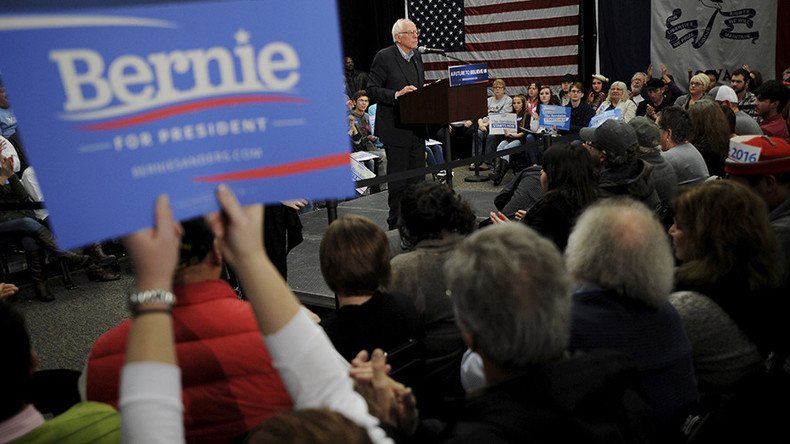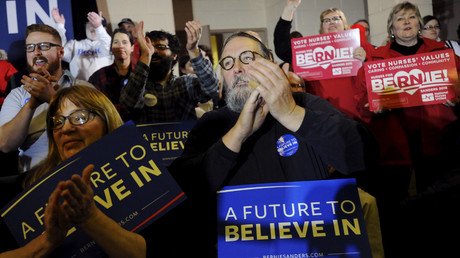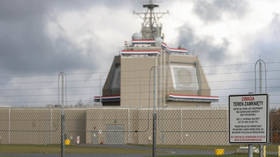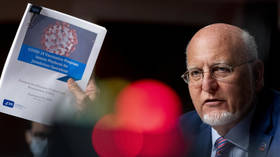Bernie Sanders' supporters 'frustrated with emerging low-wage police state’

There is a real fear among the powers that be not of what Bernie Sanders is, but what he could become, says political analyst Caleb Maupin.
Rallies in support of Democratic presidential hopeful Bernie Sanders have drawn thousands across the US. The attendees were upset though, that the nationwide rallies went largely unnoticed by the mainstream media which were focused on the snowstorm raging on the East Coast. To make up for the lack of media attention, people flooded Instagram with images and videos depicting the scale of the gatherings.
RT: The latest polls actually show that Sanders is edging ahead of Clinton in Iowa and has a considerable lead in New Hampshire but still it seems like Bernie Sanders has slipped again from the mainstream media coverage. Are you surprised?
Caleb Maupin: I am not. I feel like there is a real fear among the powers that be, not of what Bernie Sanders is, but what he could become. Let’s remember that Abraham Lincoln took office on a platform of not abolishing slavery and ended up leading a massive civil war to destroy slavery and really change the country. Let’s remember that [Franklin D.] Roosevelt when he first ran for office in 1932, he also had a very different platform than what ended up taking place. And I feel like the fact that people not only support Bernie Sanders, but have felt the need to go out into the streets and have marches, demonstrations supporting him is very significant. There have been many presidential candidates throughout the past few decades, but rarely do we see people having these kinds of days of action, filling the streets and marching to show support for their candidate. So, something is clearly happening here. And when presidents and political figures in the US are associated with a mass movement in the streets this has potential to be something very interesting.
RT: Why do you think Sanders is being ignored compared to the presumed establishment frontrunner Hillary Clinton?
CM: Hillary Clinton’s career is tied with the rise of the Democratic Leadership Council. This was something formed in the late 1980’s essentially to move the Democratic Party further to the right and to push it into embracing economic policies associated with neoliberalism. And Bernie Sanders really represents what average democrats believe, which is the country has been taken over by a small group of wealthy bankers, and something ought to be done about it. And while there is plenty of criticism that can be made of Bernie Sanders, he is what the average Democrat believes. And Hillary Clinton on the other hand represents a right-wing shift in the Democratic Party’s politics throughout the 1990s. If you look at the attacks that have been leveled against Sanders recently, they are almost reminiscent of the 1950s. People are trying to paint Bernie Sanders as a communist, as if he is some kind of a Soviet agent. And these attacks have really escalated because there is a real fear again of what Bernie Sanders could become. Bernie Sanders has the potential to be something very special in US politics…Bernie Sanders is emerging and becoming identified with a mass movement for raising the wages of the low-wage workers, the mass movement against racism. He is becoming the candidate who is most identified with people who are politically… frustrated with the emerging low-wage police state. And because of that I think some of the forces in power are very frightened of him.
RT: How big is the actual support for Sanders in the United States?
CM: I would say among people who traditionally vote for the Democrats, there is a huge amount of support for Bernie Sanders. Because he is saying the kind of things that they believe, not the kind of things that Wall Street wants to hear. In the US we have a mass movement right now of people demanding the minimum wage to be raised to $15 per hour. And Bernie Sanders has embraced that movement. There is a mass uprising right now against police brutality and racism. Bernie Sanders has got closer and closer to that movement as well. And Bernie Sanders is very much becoming a candidate who is associated with people in the US, ordinary, average working class people who are upset about the direction their country is moving in and feel like the Obama administration has kind of betrayed them and not offered the hope and change they were so excited about in the two elections when Obama was elected overwhelmingly. So, there is a real fight going on within the Democratic Party between the establishment Democrats, the Democratic Leadership Council and the average person who votes for the Democrats who have just not seen the changes that they want to see. And Bernie Sanders has become somewhat symbolic of the frustration among the rank-and-file of the Democratic Party, among the labor unions and among the very progressive organizations in the US.
The statements, views and opinions expressed in this column are solely those of the author and do not necessarily represent those of RT.














